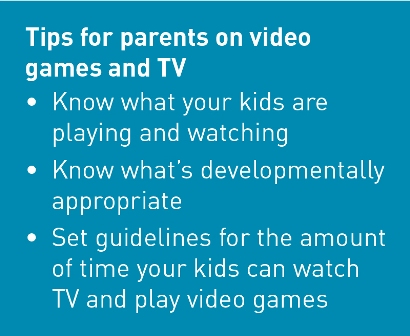Why Video Games Don’t Cause Violence: An Essay (and the benefits of playing games)

Video games have been around for decades. Video games with violence has also been a controversial subject for decades. Some people say it doesn't cause violence, and other people say it does. However, video games do not cause real-life violence. Video games can help people, be it with psychological issues, or improve cognitive function, video games still help people.
People blame violence from adolescents on video game violence. However, the ESRB rating system is there for a reason. There is proof that people pay attention and should pay attention to these ratings. “The most recent FTC data indicate that 87% of parents are aware of the system; 73% of that number (61% of parents overall) said they review the rating most or all of the time before their child plays a video game for the first time ( Spelman, Paul B., 2015).” This shows FTC data, which indicates 87% of parents are aware of the ESRB system, while 73% of that number (61% overall) said they regularly “review” the rating most, if not all of the time before letting their child play video games. This shows that while not all, but most parents are aware of the rating system, and regularly check what games their child is playing.

More than half of all parents agree that the ESRB rating system is informative. “Sixty percent of parents familiar with the system considered it "good" or "excellent" at informing them about the level of violence in a game, and 87% reported being "very" or "somewhat" satisfied with ESRB ratings. Meanwhile, 94% of parents found the ratings "moderately" or "very" easy to understand ( Spelman, Paul B., 2015).” This is saying that more than half of parents agree that the rating system is effective at informing them with what their child is playing. While 87% of them agree that the rating system is “very” or “somewhat” okay with the ratings. Also, most parents agree that the rating system is “moderately” or “very” easy to understand. Most parents do understand what their child is playing, which is why video games should not be blamed for a cause of violence. That falls under the parent’s responsibility to monitor what their child is playing.

There are also parental controls on the gaming devices. “The computer and gaming industries have developed parental controls for current PC systems and major game consoles that allow parents to monitor and manage their children's game play. These controls allow parents to limit access to the Internet, limit games by ESRB age rating, and limit the amount of time the child can play ( Spelman, Paul B., 2015).” This is saying that the gaming industry has developed controls for parents to use for gaming consoles and computers. It helps manage their children’s game time and allows to limit access to the internet and games by ESRB rating. This is very helpful because parents should be using this, which helps limit the amount of time spent playing video games. This still does fall under the parent’s responsibility to monitor what their kids are playing.

There was also a few studies done. The first one was studying 99 people with a non-violent game, or a complex but violent game. “The quick summary of the results was that aggressive content did not predict change in aggression scores above and beyond the effects of frustrations over the controls, while the control scores did predict aggression (Marczyk, J 2016, October 22).” This states that there was no change in aggression beyond the effects of frustrations over controls. While the controls did predict aggressiveness. This means that frustration plays a more significant role with losing a game, but no aggression over the content of the game.

In the second study, two versions of a game were created. One had violent content, while the other did not. “Two versions of the same game (Half-Life 2) were created, such that one contained violent content and the other did not, while the overall environment and difficulty were held constant. Again, there were no effects of content on aggression, but there was an effect of perceived mastery. In other words, people felt angry when they were frustrated with the game; not because of the content aggression (Marczyk, J 2016, October 22).” This means that two versions of a game were created, one violent one and one non-violent one. The environment and difficulty were held consistent. There were no effects of increased aggression, but there was an effect of mastery. Which means that people felt angry when they lost a game and not because of violent content.
The final study also surveyed people who played video games over the past month. “The final study surveyed regular players about their experiences gaming over the last month and aggressive feelings, again finding that the ratings of content did not predict aggressive self-reported reactions to gaming, but frustrations with playing the game did aggression (Marczyk, J 2016, October 22).” This means that they studied regular players of video games over a one-month time span on aggressive feelings, and they did not find that the content of video games did not have aggressive reactions. However, frustrations with playing the game did. Frustrations can happen with anything, not just video games. Video games have also proven to help people, too.
Video games have been proven to help people that even casually play games. “In a series of experiments on small numbers of gamers (10 to 14 people in each study), the researchers reported that gamers with previous experience of playing such action video games were better at perceptual tasks such as pattern discrimination than players with less experience (Mark Griffiths, 2018, February 16).” The article is saying that in a few experiments done on a small number of people, they reported that people with the previous experience of playing action game are better at perception tasks compared to people with less gaming experience. This helps prove that games can help people by this one experiment alone, but there is more.
In another study, they had a group of people with minimal gaming experience play 50 hours of video games over time. They concluded that “the enhanced learning of the regularity and structure of environments may act as a core mechanism by which action video game play influences performance in perception, attention, and cognition (Mark Griffiths, 2018, February 16).” What this paper means is that regularly playing video game may act as a mechanism influences performance in perception, attention, and cognition. People that even have minimal experience playing games can have benefits from playing games regularly.
Video games help people, and it does not increase aggression or violence. Most people pay attention to ESRB ratings, too. Playing video games can help people therapeutically and cognitively. “The researchers found that those who played Tetris as part of the experience had fewer intrusive memories of the trauma in total over the week immediately following the accident than the other group. They also found that the intrusive memories diminished more quickly (n.d.).” This means that not only does playing games like Tetris help trauma patients immediately, but they have fewer flashbacks of the traumatic experience over a week following an accident. More so than the control group, according to the researchers. The researchers then found that the memories of the traumatic experience diminished more quickly. This helps prove that not only video games do not cause violence, but it actually has its benefits, but there could be some negatives to it.
Some people would say people that play video games do not have a social life. That could be true for some people, but not all. “People who play video games, even if they are violent, that encourage cooperation are more likely to be helpful to others while gaming than those who play the same games competitively, a 2011 study found (n.d.).” This article is saying that even if some games are violent (such as Grand Theft Auto), some of them encourage cooperation and gamers are more likely to be helpful to others than those who play games competitively. Games such as Overwatch, promote teamwork and you win a game by working as a team. Many, many other games also include cooperation, and Overwatch is not just one example.
Other people would say people can get addicted to video games. While it does happen, you can get addicted to anything, and it is not as common as drug abuse. “At this time, however, video game addiction (GA) is not considered to be a mental disorder. Yet research suggests that 0.5 percent of all gamers and 1.7 percent of ninth graders experience symptoms associated with excessive video game use (Vitelli, R. 2013, August 19).” This article says that only half a percent of gamers are addicted to video games, while closer to two percent of ninth graders are addicted to video games. That is still a considerably low number when you take into account how many people play video games, even daily. Also, video game addiction is not a diagnosable disorder, yet.
In conclusion, we found that video games do not cause violence and can help people. While studying video games and mental effects is still in its infancy, it does show promising results. With this in mind, more people should keep an open mind, but also be wary of what games their child is playing. If that happens, then changes could be made on the outlook of the gaming community.
References
Marczyk, J. (2016, October 22). Violence In Games Does Not Cause Real-Life Violence. Retrieved from https://www.psychologytoday.com/blog/pop-psych/201610/violence-in-games-does-not-cause-real-life-violence
Mark Griffiths Director of the International Gaming Research Unit and Professor of
Gambling Studies, Nottingham Trent University. (2018, February 16). Playing video games is good for your brain – here's how. Retrieved February 25, 2018, from https://theconversation.com/playing-video-games-is-good-for-your-brain-heres-how-34034
Playing Tetris Can Reduce PTSD Symptoms. (n.d.). Retrieved February 25, 2018, from http://time.com/4720555/tetris-ptsd-trauma-study/
Spelman, Paul B., et al. "The Video Games Rating System Is Effective." Violent Video Games, edited by Roman Espejo, Greenhaven Press, 2015. At Issue. Opposing Viewpoints in Context, http://ezproxy.snhu.edu/login?url=http://link.galegroup.com/apps/doc/EJ3010926211/OVIC?u=nhc_main&xid=ef951a85. Accessed 25 Feb. 2018. Originally published as "Brief of the Cato Institute as Amicus Curiae Supporting Respondents,", Sept. 2010.
Video Games Play May Provide Learning, Health, Social Benefits. (n.d.). Retrieved February 25, 2018, from http://www.apa.org/news/press/releases/2013/11/video-games.aspx
Vitelli, R. (2013, August 19). Are Video Games Addictive? Retrieved February 25, 2018, from https://www.psychologytoday.com/blog/media-spotlight/201308/are-video-games-addictive
Images:
http://thedrudgereort280.web.fc2.com/reviews/essays-2016923537/